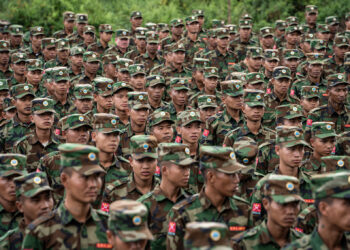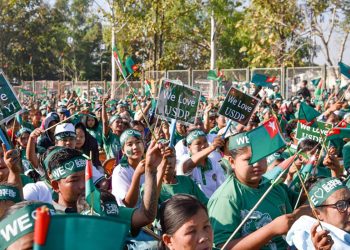YANGON—After a long delay, the Union-level Joint Ceasefire Monitoring Committee (JMC) will meet again in March, according to government peace negotiator U Hla Maung Shwe.
The JMC was formed in late 2015 following the signing of the Nationwide Ceasefire Agreement (NCA) between the government and ethnic armed organizations (EAOs) in October of that year. Its role includes monitoring NCA signatories’ implementation of the ceasefire. The last meeting of the JMC took place more than a year ago.
Following a three-day meeting between the government’s peace delegation and representatives of the 10 NCA signatories at the National Reconciliation and Peace Center in Yangon this week, U Hla Maung Shwe told reporters on Tuesday that the two sides had agreed to meet next month.
“We discussed resuming the JMC meeting. As you all know, the government has proposed resuming the JMC meeting from March 10-12. And we expect the meeting will be held on those dates,” said U Hla Maung Shwe.
Nai Ong MaNge, a spokesperson for the 10 NCA signatories, said the two sides also agreed dates for holding the Union Peace Dialogue Joint Committee (UPDJC) secretarial meeting and the UPDJC meeting, which are instrumental in convening the 21st-Century Panglong Peace Conference, as well as national-level political dialogues in Shan and Rakhine states ahead of the peace conference.
The two sides also agreed to hold a Joint Implementation Coordination Meeting (JICM), the highest-level meeting within the national peace process, in March.
The government and the 10 NCA signatories are also in the process of discussing the political structure they envision for the Union beyond 2020. The two sides exchanged proposals on the Union structure and will submit them to their top leaders, Nai Ong MaNge said.
“A series of discussions will be held step by step,” he said.
The agreement to resume the JMC meeting indicates that trust has been restored between the two sides, U Hla Maung Shwe said.
At a peace summit from Oct. 15-16 in 2018, the Myanmar military and government demanded that ethnic states vow never to seek secession from the Union, and to accept a single military. Disagreements over the demands brought the summit to a halt.
On Oct. 27 of that year, Saw Mutu Say Poe, the chairman of the Karen National Union (KNU)—an NCA signatory—sent a letter to State Counselor Daw Aung San Suu Kyi informing her that the KNU would suspend its participation in formal peace meetings. Another signatory, the Restoration Council of Shan State, followed suit, saying it would not attend future JMC meetings if the committee continued to lack impartiality, equality and justice at its various levels.
The JMC implements ceasefire monitoring through its Union-, state- and local-level committees. The Union-level JMC consists of 26 members—10 representatives each from the government and 10 EAOs, and six civilians.
The Union-level JMC’s procedures call for it to meet every two months. In case of complaints about disputes, shootings, violations of the military’s code of conduct, and violations of the NCA such as recruitment or burdening of civilians, the local-level JMC is responsible for convening a meeting and reporting its decision to the state-level JMC. If the state-level JMC cannot resolve the issue, it will report it to the Union-level JMC for settlement.
Translated from Burmese by Thet Ko Ko
You may also like these stories:
Myanmar Reportedly Set to Be Placed on Global Money-Laundering Watchlist
EU Honors Myanmar Rights Advocates at Fourth Schuman Awards
Fighting Blocks off Food Supplies to Myanmar’s Chin State Township
















